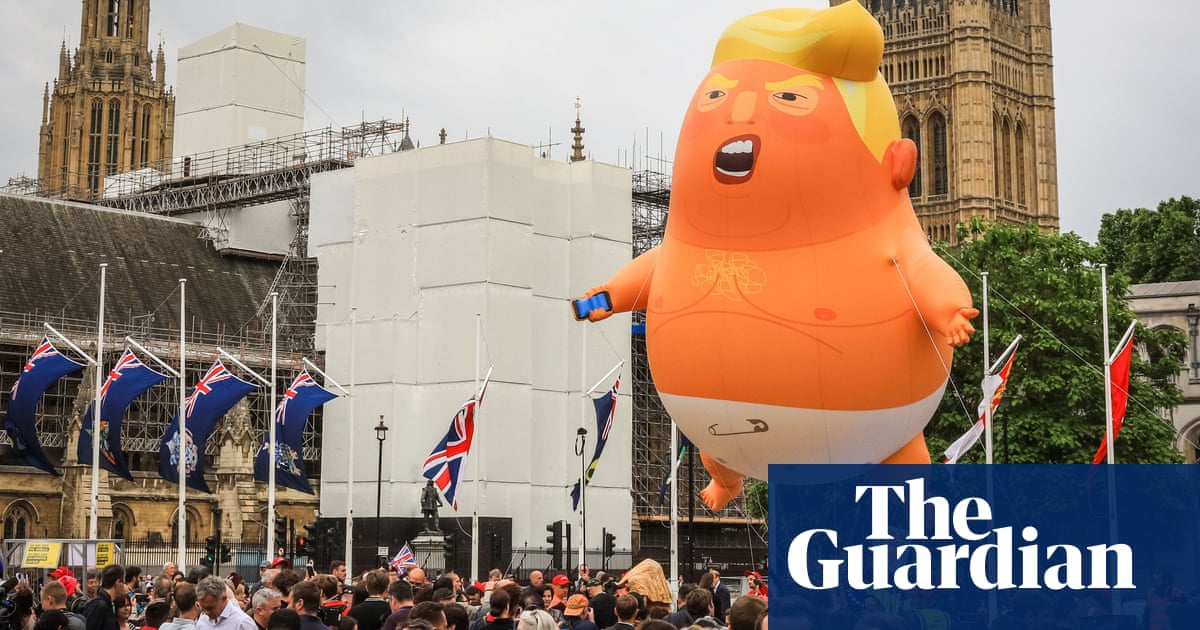Donald Trump’s second visit to the UK later this year will be disrupted by “even bigger” protests than those that coincided with his state visit in his first term, campaigners have vowed.
On Thursday Trump let slip that he expects tovisit the UK in September,after Keir Starmer handed him a personal invitation from King Charles III during his visit to the White House in February.
TheStop Trump coalitionhas predicted its protests will surpass demonstrations that coincided with Trump’s state visit in 2019 when up to 250,000 took part in a“carnival of resistance”.
Zoe Gardner, a spokesperson for the coalition, said: “This time it will be even bigger, uniting campaigners across a huge range of issues. We are confident that the disgust at Donald Trump is just as strong across the country.”
Protesters plan to dust off a blimp of Trump dressed in a nappy that was the focal point of previous anti-Trump protests, but also replace it with a larger version.
Gardner said: “The blimp will be there or something even bigger and better. The blimp itself still exists, but we are thinking we want to take the next step and do something even more exciting.”
The coalition is hoping theLondonmayor will again grant permission for anti-Trump blimps to fly over the capital.
Gardner said: “Last time Sadiq Khan gave us permission to fly it. He will probably do so again, but we will have to get various permission from the GLA and the police. It might be different from last time but we are confident that a lot of people will want to come out on to the streets and show their disgust.”
The demonstrations will be a test for the police even with tougher laws available tocrack down on protests and activism.
Gardner said: “We want it to be a defiant but joyful celebration of all the things that Trump hates, such as the rights of LGBTQ people, the rights of women, the rights of migrants and refugees, union power and workers’ rights. It will celebrate every marginalised group in society.”
The demonstrators will also target the tech and business leaders that have backed Trump. Gardner said: “If we had one strapline it would be‘Stop Trump and fight the oligarchy’. We are against empowering the super-rich, including treating Gaza like real estate and chumming up to Putin and the tech billionaires who are looking to the UK for tax breaks.”
Sign up toFirst Edition
Our morning email breaks down the key stories of the day, telling you what’s happening and why it matters
after newsletter promotion
Giant papier-mache models of the tech leaders that appeared at Trump’s inauguration including Jeff Bezos, Mark Zuckerberg and Elon Musk will make an appearance at the protests, Gardner said. As will a dancing troupe of chlorinated chickens to mock the UK’s planned trade deal with the US.
The coalition has the support of a number of campaigns includingGlobal Justice Nowand the US leftist group theIndivisibles Movement, as well as a groups backing Palestine and Ukraine.
Starmer offered the UK visit as part of a charm offensive towards Trump aimed at trying to secure a favourable trade deal with the US. Gardner predicted that the protesters will vent their anger at Starmer as well as Trump.
Gardner said: “Starmer should be shamed by these demonstrations. The whole country has been embarrassed by his display of rolling over like a pathetic poodle to whatever Trump does. Starmer’s approach of sucking up is not getting us anywhere.”
She added: “We are looking for anyone who has a fun idea to come forward, because we really want to show Trump what we think of him.”
